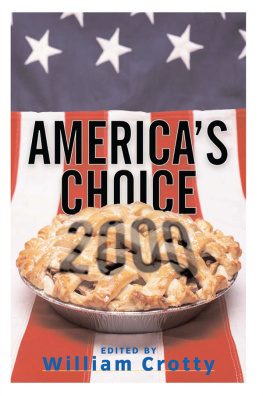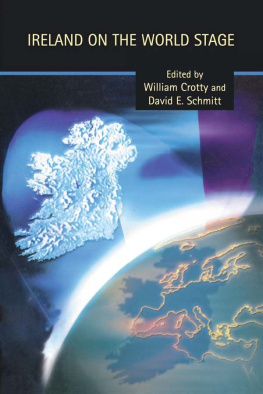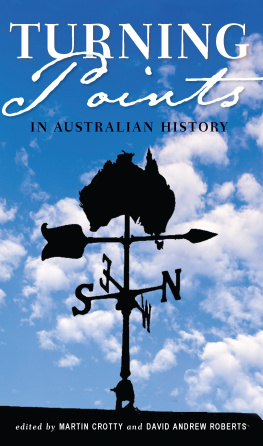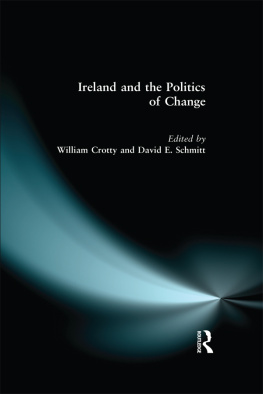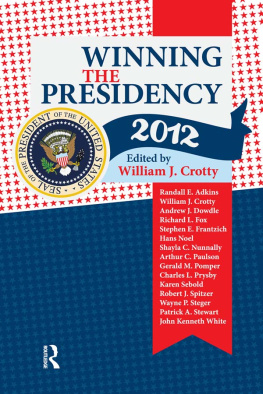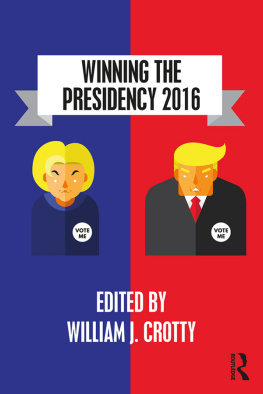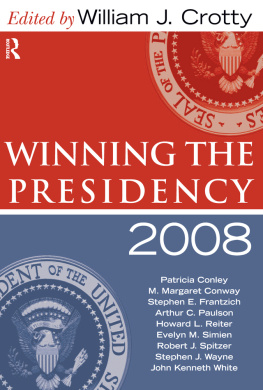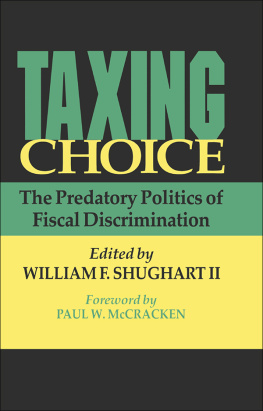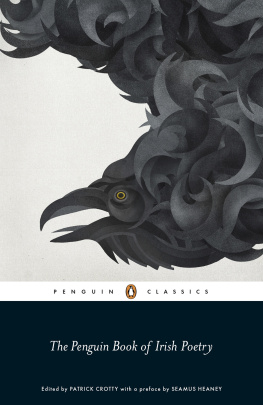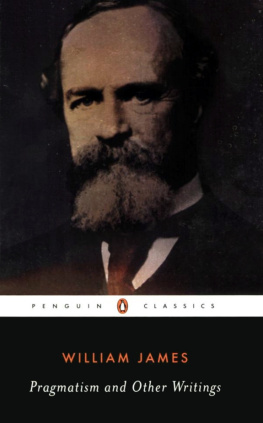Dilemmas in American Politics
First published 2001 by Westview Press
Published 2018 by Routledge
711 Third Avenue, New York, NY 10017, USA
2 Park Square, Milton Park, Abingdon, Oxon OX14 4RN
Routledge is an imprint of the Taylor & Francis Group, an informa business
Copyright 2001 by Taylor & Francis
All rights reserved. No part of this book may be reprinted or reproduced or utilised in any form or by any electronic, mechanical, or other means, now known or hereafter invented, including photocopying and recording, or in any information storage or retrieval system, without permission in writing from the publishers.
Notice:
Product or corporate names may be trademarks or registered trademarks, and are used only for identification and explanation without intent to infringe.
Library of Congress Cataloging-in-Publication Data
A CIP catalog record for this book is available from the Library of Congress
ISBN 13: 978-0-8133-6798-9 (pbk)
This book attempts to make sense of the longest running, most fiercely contested and, ultimately, closest race in the history of presidential elections. What had been an earnest if predictable general election campaign morphed into a post-election day series of controversies that tested the nation's electoral processes, its courts, and its democratic culture. Eventually, of course, a winner was declared and the nation went about its business, however not before fundamental questions were raised as to the nature of the vote and voter intent and both the standards and processes used to decide elections. These issues will be with us for years to come. By any standard, it was a historic election whose full consequences are yet to be appreciated.
The following sifts through the competing claims and strategies, reviews what occurred and offers some assessments as to the quality of the campaign, the nature of the final decision and the meaning this has to the nation.
I would like to thank a number of people who contributed to this effort: Leo A.W. Wiegman, Executive Editor, Westview Press; David Pervin, also of Westview Press; Robert Curtin and James Rossi my research assistants; and Janet-Louise Joseph and Barbara Mcintosh-Chin of the Department of Political Science at Northeastern University. A particular debt of gratitude is owed my wife Mary Hauch Crotty.
William Crotty
Thomas P. O'Neill
Chair in Public Life and
Director of the Center for the
Study of Democracy at
Northeastern University
William Crotty
Introduction
It began as a referendum on the Clinton Administration. It featured Clinton's vice president, AI Gore, running against George W. Bush, the son of the former president Bill Clinton had defeated in 1992.
The early favorite was Vice President Al Gore. It was his election to lose. The Clinton years had been a period of prolonged economic expansion, the most sustained in modern American history. The federal debt had been reduced substantially, unemployment was the lowest in decades, consumer spending and confidence was high, and the stock market reached record levels. The economic worries that had paved the way for Clinton's victory eight years earlier no longer were of concern. There was peace on the international front.
Gore was an able, experienced candidate, well-funded and seemingly well-prepared for the presidency. In political terms, early projections (which proved to be accurate) were that the Democrats would carry the two most populous states, California and New York, usually considered the keys to winning. He faced in George W. Bush a candidate inexperienced in national politics, personally unfamiliar to the American public, and one who had been in public office a total of five years when the race began.
It was to turn out to be one of the closest, hardest fought, and most contentious elections in modern history. The results were not to be known until well after the last votes were counted. In the process, a relatively dull contest would end in deadlock, with the winner to be determined through contested recounts and court actions that stretched well past election day. The defining event of election 2000 was to be its aftermath.
The following reviews the events of the campaign, the issue positions of the candidates, analyzes the vote and reviews the election's often bitter aftermath. It serves as both an overview of the campaign and an introduction to the chapters that follow.
The Clinton Factor
Al Gore had served under Bill Clinton for eight years and had come as close as a vice president does to being co-president. Yet Bill Clinton was to prove a problem for the Gore campaign. The architect of the most sustained economic expansion in the post-World War II period (and some would say since the nation's founding) and the most accomplished and talented politician of the contemporary era, it would seem natural that the Democrats would call on his skills for the campaign. There was no question that Clinton was eager to campaign (a point he made repeatedly). He wanted to see his protg elected, his record vindicated, and the prosperity and policies he fought for continued.
Clinton was not to fulfill the role in the campaign he had hoped for. He had personal and political baggage that Gore wanted to disassociate himself from (hence the statement in his acceptance speech at the national convention, repeated in the debates and on the campaign trail, "I am my own man"). The Clinton years had been marked by continued investigations, special prosecutors, and congressional hearings looking into alleged misdeeds by the president and his wife, both before taking office and once in the presidency It had been a strident, highly partisan, tense, and unpleasant time, culminating in the Monica Lewinsky sex scandal and the impeachment of the President by the House of Representatives and his acquittal by the Senate. It was a period Gore did not want recalled.
Politically, the Gore campaign calculated that Clinton was least popular among the swing voters and in the swing states Gore hoped to focus on. In choosing Senator Joseph I. Lieberman of Connecticut as his running mate, Gore had selected the first Democrat senator to condemn Clinton's behavior on the Senate floor, speaking and chastising the President for his conduct in the Lewinsky affair and lying about it to a grand jury (it was Clinton's claim that technically and under the law he had not lied; it was this incident that led to the impeachment effort). Lieberman was to later vote against the President's impeachment, but it is this speech that brought him his first sustained national attention in twelve years in the Senate.
Gore also had to contend with Hillary Rodham Clinton running for the Senate in New York, although this turned out not to be a problem.
The vice president made minimal use of the President in the campaign and avoided being seen with him to the extent a vice president could. Clinton did sum up and defend his administration's record in a well-received speech to the Democratic National Convention, but after that made few campaign speeches. When he did, he presented the case for continuing his administration's successes ("the next best thing to electing me to a third term would be to elect Al Gore president") more effectively and more forcefully than Gore was ever able to do ("if you want to keep the prosperity going elect AI Gore president"). Still, his role was restricted. He ended the campaign by going to New York to campaign briefly for his wife (who also had made limited use of his skills in her race), and returning to Arkansas to stump for local candidates before flying back to New York, his new home state, to vote. It was a curiously deflated ending to the Clinton years. Arguably, the muzzling of Clinton in the campaign was a strategic mistake that could have cost Gore a decisive edge in the election. In many respects, Gore had not come to terms with the previous years or with his relationship to the president and the Clinton legacy.


